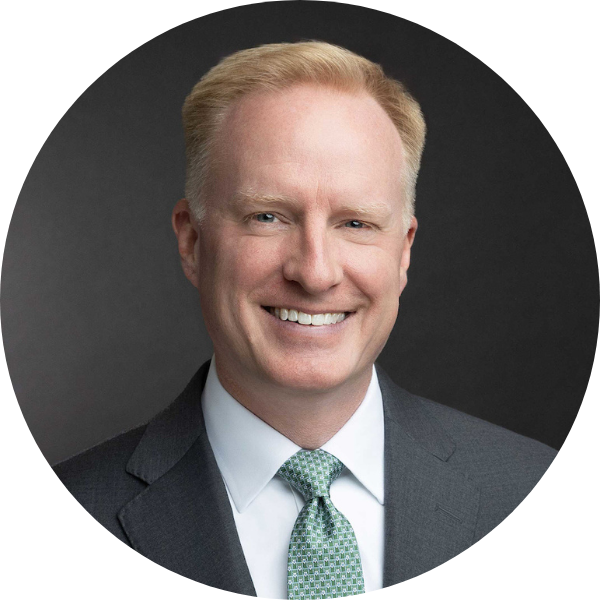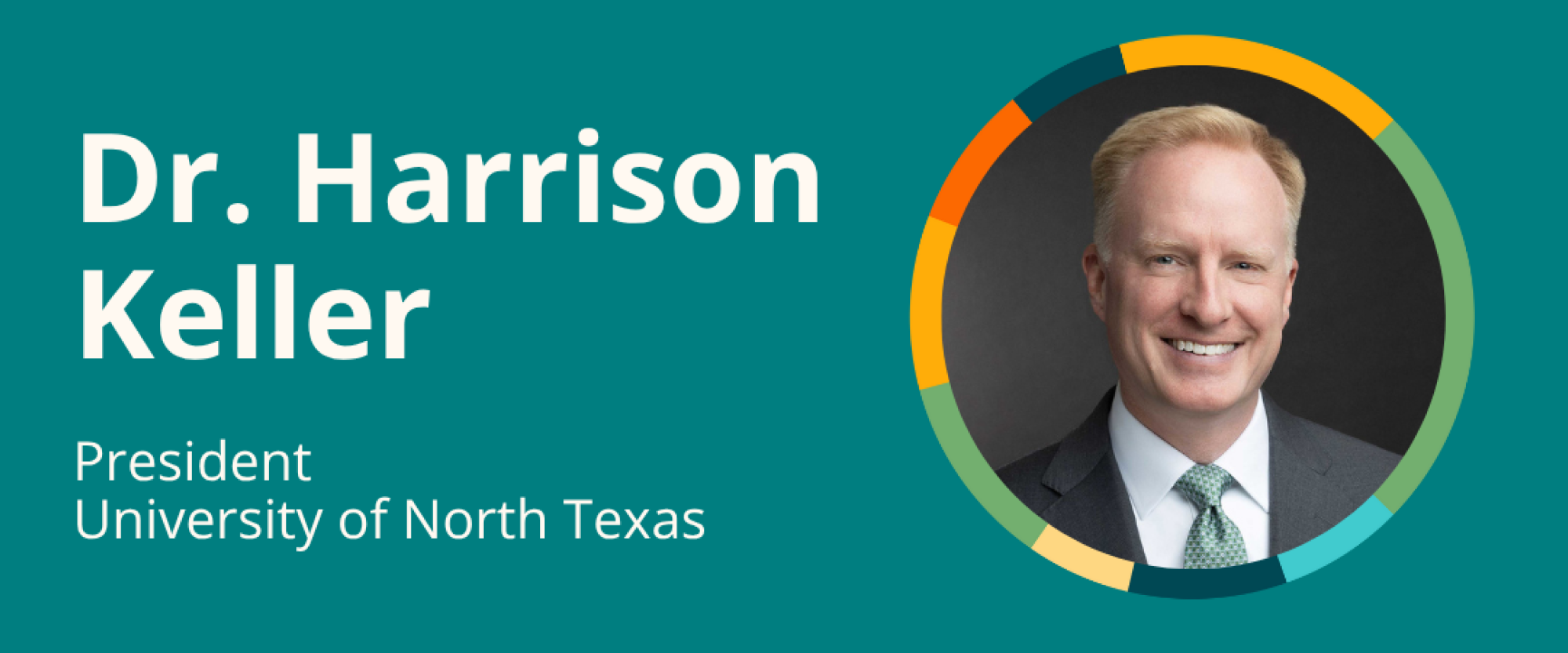Confidence in higher education is starting to climb again, but questions about its value still linger. For Dr. Harrison Keller, President of University of North Texas (UNT), the path forward depends on how colleges connect what students learn in classrooms to the skills, opportunities, and partnerships that power the economy.
On The Innovating Together Podcast, Keller argues that the future of higher education depends on our ability to connect purpose with practicality, or more specifically, the human development that occurs in classrooms with the data-driven decision-making that powers communities and economies.
His experience in philosophy, state policy, and the U.S. Navy Reserve has shaped a leadership approach that blends humility with systems thinking. Keller shares how higher ed can stay relevant by grounding its work in purpose, actionable intelligence, and collaboration.
Maintaining a Positive Focus in Higher Ed Leadership
Before diving into data and technology, Keller grounds his leadership philosophy in something more fundamental: optimism and direction. Drawing from his time as senior education advisor in the Texas House of Representatives, he recalls a lesson that has shaped his approach ever since.
“Texas politics is full contact, so we learned a lot of hard lessons, and we got a lot done,” he said. “Tom [Craddick] would tell us, ‘People want us to do big things. That's why they sent us here. But we have to give them something they can be for.’”
For Keller, that mindset is essential in today’s higher ed landscape, where leaders can feel “like a West Texas hailstorm coming from all directions at the same time.” When chaos hits, he looks to a lesson from his grandfather’s cotton fields: pick a reference point, make small adjustments, and don’t look back.
“For me, that reference point is a commitment to deliver value—for students, employers, communities, and the state,” he says. “We have to be in dialogue with employers about what they need and reflect on what it means to educate citizens who can think critically and make a difference.”
Amid these challenges, Keller intentionally builds joy into his schedule. “You have to have joy,” he says. “Otherwise, it’s the first thing that disappears.” For him, that means spending time with students, often in the university’s world-renowned music program, to reconnect with the energy that makes campus life meaningful.
Measuring the ROI of Higher Ed Experiences
As questions about the value of college continue to dominate public debate, Keller argues that the real issue isn’t whether higher education is worth it, but how we define “worth.”
He believes that, while it’s reasonable to ask about return on investment (ROI), higher education’s value extends beyond short-term earnings. It’s about how institutions prepare students for adaptable, meaningful work and life.
Keller often points to his background in philosophy as formative, teaching him humility, ethics, and critical thinking that continue to shape his leadership.
During his tenure on the Texas Higher Education Coordinating Board, he led an extensive study of the relationship between college credentials and value in the economy, particularly for students majoring in the humanities.
“A lot depends on your path,” Keller explains. “If some students fold in an internship or a project management certification, it gives them more options in the economy.”
At the same time, he believes this is “a time for the humanities to shine.” Employers consistently identify communication, critical thinking, and collaboration as the skills they value most: strengths deeply rooted in liberal arts education.
The Value of Actionable Intelligence
Before becoming a university president, Keller served as an intelligence officer in the U.S. Navy Reserve, a decade that deeply shaped how he thinks about leadership and data.
His central lesson: information only matters if it leads to action. That concept of actionable intelligence – data that institutions can actually use – now drives his approach to higher education and economic partnerships.
At UNT, this idea inspired an “intelligence fusion center” in the Dallas–Fort Worth region, built in collaboration with employers, chambers of commerce, and other educational institutions.
“Looking at employers, chambers of commerce, economic development corporations, community colleges, technical colleges, and other like-minded universities, how would you put together a structure for a regular heartbeat of communication? You're looking at the data. You've got the human intelligence coming in from the employers and trying to distill that into actionable intelligence. How do we inform the kinds of decisions that people need to make within the institutions?”
For Keller, this collaborative model builds trust at both ends of the talent pipeline—helping institutions align programs with workforce needs and preparing employers to better support graduates entering the economy.
“There's an overwhelming amount of data that institutions don't really know what to do with. I've been part of several projects where we put these beautiful dashboards together and people didn't use 'em at all. You have to figure out how to present this intelligence in a way that somebody can put into their workflows. And that's pretty tricky to distill.”
In short, Keller’s view of actionable intelligence is about relationships, communication, and the discipline to turn insights into outcomes.
Keeping Pace With AI
Artificial intelligence is redefining how every sector works, including higher education. Keller sees this moment as a test of how quickly institutions can adapt, learn, and collaborate.
He points to Google’s recent billion-dollar investment in AI resources for higher education as evidence of just how fast the technology is evolving.
For Keller, the takeaway is clear: universities can’t go it alone. “The only way to provide value to students and stay current is to work on this with industry, across institutions,” he says. “We’ve got to share resources.”
He argues that this collaborative mindset requires higher ed to move faster: testing new technologies, learning what works for different kinds of students, and applying those lessons to how institutions themselves operate.
Keller’s reflections remind us that higher education’s strength lies in its ability to connect timeless purpose with present-day practicality. Whether through data, AI, or collaboration across sectors, his approach centers on one idea: value must be earned every day through relevance, trust, and shared learning. As institutions navigate uncertainty, his call to “give people something they can be for” offers a clear compass for what comes next.
Note: This episode of the University Innovation Alliance’s Innovating Together Podcast originally aired on August 11, 2025. The podcast appears live on YouTube, Facebook, Twitter, and LinkedIn.
Resources Mentioned in This Episode
-
University of North Texas
UNT, located in Denton, Texas and serving the Dallas-Fort Worth metro area, is one of the nation’s largest universities. It offers a wide range of degree programs (114 undergrad, 87 master’s, and 39 doctoral) and collaborates extensively with regional business, educational, and cultural communities. - Texas Higher Education Coordinating Board
The THECB is a partner, resource, and advocate to higher ed institutions across the state. During Harrison’s tenure as CEO for this government agency, Texas became a national leader in increased support for higher ed and university research, advancing policy and programs to improve college readiness and student success. - College Attainment and Economic Prosperity - UIA
Explores how increasing college attainment strengthens local and national economies. It highlights data-driven strategies that help institutions expand access, improve completion rates, and connect degrees to workforce and community impact. - Google’s AI initiative for colleges
Announced in 2025, this billion-dollar investment provides universities with training, tools, and resources to integrate artificial intelligence into teaching, research, and operations. The initiative aims to help higher ed institutions stay current with rapid advances in AI while preparing students for an evolving job market. - 10 to 25: The Science of Motivating Young People by David Yeager
Grounded in psychology and behavioral science, Yeager’s book distills decades of research on how educators can inspire purpose, perseverance, and a growth mindset in young people. Keller cites it as a powerful guide for leaders and mentors striving to combine high standards with high support. - The First 90 Days: Proven Strategies for Getting Up to Speed Faster and Smarter by Michael D. Watkins
Harrison recommends Yeager’s and Watkins’ books as must-reads for anyone who works in education, whether on the ground or in a leadership position.
Watch the Archive
Bios of Guest and Co-Hosts

Dr. Harrison Keller became the University of North Texas’ 17th president in August 2024, an innovator and leader with over 25 years of experience in state educational budget and policy, university administration, fundraising, and building coalitions among higher education institutions, school districts, and policymakers to expand opportunities through education. Prior to joining UNT, Dr. Keller served as Commissioner of Higher Education and CEO for the Texas Higher Education Coordinating Board (THECB), making Texas a national leader in increased support for higher education and university research. Under his visionary leadership, THECB advanced policy and programs to improve college readiness and student success — especially for low-income and first-generation college students — leading development of the 2022 strategic plan Building a Talent Strong Texas. He also led the design and implementation of a new outcomes-based community college finance system. Before joining THECB, Dr. Keller served the University of Texas at Austin as Deputy to the President for Strategy and Policy, Vice Provost for Higher Education Policy and Research, and Executive Director of the Center for Teaching and Learning. He developed multiple large-scale initiatives to support students’ transitions from high school to college, including OnRamps, which provides college-level courses to tens of thousands of students across the state each year. Before coming to UT Austin, Dr. Keller was a legislative aide in the Texas Senate and Texas House of Representatives, Director of Research for the Texas House, and Senior Education Advisor for the Speaker of the Texas House. He earned a bachelor’s from the University of Notre Dame and a master’s and Ph.D. in philosophy from Georgetown University. From 2005 to 2015, he served as an intelligence officer in the U.S. Navy Reserve. He and his wife, Gena Nivens Keller, have three children.

Co-Host: Bridget Burns, Executive Director, University Innovation Alliance
As a trusted advisor to university presidents and policymakers, Dr. Bridget Burns is on a mission to transform the way institutions think about and act on behalf of low-income, first-generation, and students of color. She is the founding CEO of the University Innovation Alliance, a multi-campus laboratory for student success innovation that helps university leaders dramatically accelerate the implementation of scalable solutions to increase the number of college graduates.

Co-Host: Sara Custer, Editor-in-Chief, Inside Higher Ed
Sara Custer became Inside Higher Ed’s editor-in-chief in 2024 after serving four years at Times Higher Education. At THE, she worked across departments to launch and grow the Campus platform, and then lead its editorial team. Prior to that role, she served as digital editor, helping to launch THE’s newsletter strategy and overseeing daily, weekly, and monthly publications. Ms. Custer was previously editor and senior reporter at The PIE News, a website and magazine covering the international education industry. She grew up in Cushing, OK., and earned a B.A. in English literature from Loyola University Chicago and an M.A. in international journalism from City, University of London. As a journalist, she has covered global higher education for more than five years.
About Innovating Together
Innovating Together is an event series that happens live on YouTube, Facebook, Twitter, and LinkedIn. It also becomes a podcast episode. Every week, we join forces with Inside Higher Ed and talk with a higher education luminary about student success innovations or a sitting college president or chancellor about how they're specifically navigating the challenges of leadership. We hope these episodes will leave you with a sense of optimism and a bit of inspiration.
Rate, Review & Subscribe
Learn why hundreds of people have rated the Innovating Together podcast 5 stars. Please join others and rate and review this podcast. This helps us reach and inform more people -- like you -- who are committed to helping more students succeed.
Click here, scroll to the bottom, tap to rate with five stars, and select “Write a Review.” Then be sure to let us know what you loved most about the episode. Also, if you haven’t done so already, subscribe to the podcast. You'll never miss an episode.

